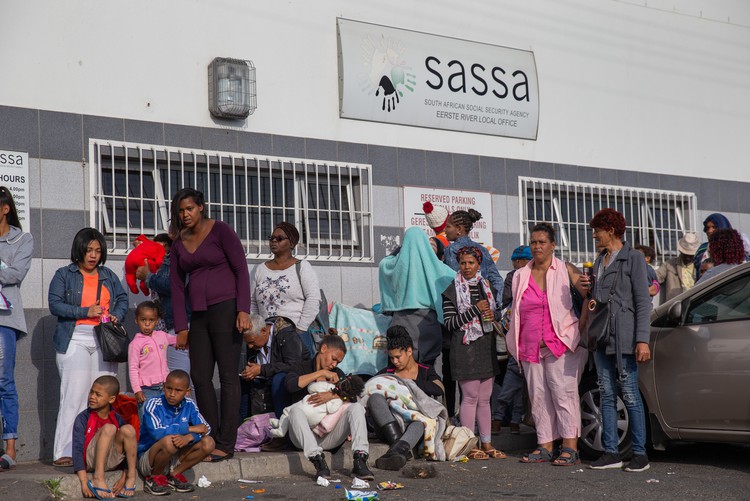Agency accused of turning down too many applicants
By Liezl Human
People queue for social grants outside the SASSA office in Eerste River, Cape Town. Archive photo: Ashraf Hendricks
- Beneficiaries of the R350 Social Relief of Distress (SRD) grant are being excluded because of a means test and a budget cap, according to the Institute for Economic Justice (IEJ).
- The IEJ is disputing the SRD regulations, saying millions of people are unfairly excluded because of a budget cap.
- The South African Social Security Agency (SASSA) said that the grant is misunderstood and it is not an unemployment grant.
Kersha Govender, from Richards Bay, told GroundUp that she received the R350 Social Relief of Distress (SRD) grant for several months starting in 2021, but she was turned down for four months this year. She appealed this, but her appeals were rejected by the South African Social Security Agency (SASSA) tribunal.
Several of her previous rejected applications since 2021 were approved after she went to the appeals tribunal. But more recently, her appeals were rejected for the months of January, February, June and July 2023.
Under the SASSA means test, beneficiaries may not receive more than R624 into their accounts per month. But Govender insists she has received no other income into her account other than the social grant.
She is far from alone, according to the Institute for Economic Justice (IEJ). It says millions of people eligible to receive the grant are being excluded by SASSA because of an income means test and a budget cap.
The IEJ points out that SASSA has said over a million appeals are rejected each month due to the means test.
The IEJ and #PayTheGrants are now disputing the SRD regulations in litigation – launched in the Pretoria High Court in July this year – against SASSA and the Department of Social Development (DSD).
The court application aims to challenge the SRD regulations.
The IEJ is challenging the online-only application process, which excludes people who have no internet access.
It is also challenging the database verification procedure, which uses “outdated” and “erroneous” information from the South African Revenue Service, the National Student Financial Aid Scheme, and the Unemployment Insurance Fund.
It further challenges a “narrow appeals process” which prohibits unsuccessful applicants from providing further evidence or information in their appeal.
The court challenge seeks a narrower definition of “income” to be implemented, meaning income received from someone supporting themselves, such as employment, and not, for instance, receiving financial support from a family member.
According to the IEJ, about 16 million people earning below R624 per month qualify for the grant. But only about 8.5 million people are approved for the grant every month.
In June 2022, during a parliamentary briefing, the DSD said the grant was limited to 10.5 million beneficiaries, but in the same briefing said survey data showed 13.4 million people have no income, and 18.3 million people live below the food poverty line.
Kelle Howson, senior research associate at the IEJ, told GroundUp that eligible beneficiaries are being deliberately excluded due to a budget cap imposed by National Treasury in 2022.
“So many people who are unemployed and have no regular source of income, and experience food poverty with insufficient income to meet their basic nutritional needs, do not qualify for the SRD grant,” said Howson.
StatsSA recently released the latest national poverty line (NPL) figures: R760 for the food poverty line; R1,058 for the lower-bound poverty line; R1,558 for the upper-bound poverty line.
In court papers, the IEJ points out that a parliamentary briefing during which the DSD and SASSA provided data indicating that for July, August, September, and October 2022, all appeals against rejections on the grounds of alternative income source were unsuccessful. These numbers ranged roughly between 1.2 and 1.5 million appeals per month.
SASSA spokesperson Omphemetse Molopyane said the grant is misunderstood. “Many believe it’s an unemployment grant – hence if not employed, they should receive the grant.”
Molopyane said SASSA checks “funds flowing into a client’s bank account and mobile money transfers to the client”.
“These are checked monthly and clients with income flows more than the threshold into their bank account or who received a mobile money transfer, will be excluded. SASSA also checks all bank accounts of the client, not just the one that they request any approved funds to be paid into,” said Molopyane.
Molopyane said that if the appeals tribunal, which checks if SASSA “has made a mistake”, rejects the appeal, the beneficiary has recourse in court. “However, this would be at the client’s cost.”
National advocacy manager for the Black Sash, Hoodah Abrahams-Fayker, says the SRD grant in 2020 was a “lifeline” for many and “an acknowledgement by the government that the unemployed in South Africa are vulnerable and require social assistance”.
Abrahams-Fayker said that the government has a constitutional obligation “to provide social assistance to those who cannot support themselves so that they can put food on the table and hopefully have a little resources to generate an income”.
She said the current grant should be increased to match inflation.
DSD spokesperson Lumka Oliphant said that the department could not yet indicate whether it would oppose the court case.
Follow African Insider on Facebook, Twitter and Instagram
Picture: Pexels
For more African news, visit Africaninsider.com



